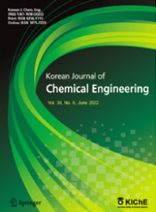Articles & Issues
- Language
- English
- Conflict of Interest
- In relation to this article, we declare that there is no conflict of interest.
- Publication history
-
Received February 20, 2009
Accepted March 27, 2009
-
 This is an Open-Access article distributed under the terms of the Creative Commons Attribution Non-Commercial License (http://creativecommons.org/licenses/bync/3.0) which permits
unrestricted non-commercial use, distribution, and reproduction in any medium, provided the original work is properly cited.
This is an Open-Access article distributed under the terms of the Creative Commons Attribution Non-Commercial License (http://creativecommons.org/licenses/bync/3.0) which permits
unrestricted non-commercial use, distribution, and reproduction in any medium, provided the original work is properly cited.
Copyright © KIChE. All rights reserved.
All issues
Production of 3-hydroxypropionic acid by recombinant Klebsiella pneumoniae based on aeration and ORP controlled strategy
1College of Life Science and Pharmacy, Nanjing University of Technology, P. R. China, Korea 2State Key Laboratory of Materials-Oriented Chemical Engineering, No.5 Xinmofan Road,, Korea
biotech@njut.edu.cn
Korean Journal of Chemical Engineering, November 2009, 26(6), 1679-1685(7)
https://doi.org/10.1007/s11814-009-0240-5
https://doi.org/10.1007/s11814-009-0240-5
 Download PDF
Download PDF
Abstract
A biosynthetic pathway for the production of 3-hydroxypropionic acid (3-HP) from glycerol was established in recombinant Klebsiella pneumoniae by introducing the aldehyde dehydrogenase gene from Escherichia coli. The activity of aldehyde dehydrogenase, which oxidized 3-hydroxypropionaldehyde (3-HPA) to 3-HP, was detected and 3-HP was produced by the recombinant strains. Three different oxygen supply strategies, associated with measuring the oxidoreduction potential (ORP) during the fermentation under these conditions, were adopted for higher production of 3-HP by the recombinant cells. About 0.8 g/l 3-HP and more 1,3-propanediol production by the recombinant Klebsiella pneumoniae were obtained under completely aerobic conditions. Under micro-aerobic conditions, 3-HP production could be increased to 2.2 g/l and 1,3-propanediol production was almost the same as in the original strain. Under the anaerobic conditions, 1,3-propanediol was the main product and about 1.3 g/l 3-HP was produced. Finally, 3-HP production of the recombinant strain was increased to 2.8 g/l under micro-aerobic condition with a further two-stage ORP controlled strategy.
Keywords
References
Skraly A, Lytle BL, Cameron DC, Appl. Environ. Microbiol., 64, 98 (1998)
Yamashita M, Hattori N, Nishda H, Polym. Prepr. Jpn., 43, 3980 (1994)
Gokarn RR, Selifonova OV, Jessen HJ, Gort SJ, Selmer T, Buckel W, US patent 7,186,541 (2007)
Nakamura CE, Whited GM, Curr. Opin. Biotech., 14, 454 (2003)
Harada T, Hirabayashi T, Agric. Biol. Chem., 32, 1175 (1968)
Miyoshi T, Harada T, J. Ferment. Technol., 52, 196 (1974)
Hasegawa J, Ogura M, Kanema H, J. Ferment. Technol., 60, 591 (1982)
Ishii M, Chuakrut S, Arai H, Igarashi Y, Appl. Microbiol. Biotechnol., 64(5), 605 (2004)
Suthers PF, Cameron DC, US patent 6,852,517 (2005)
Xu XL, Zhang GL, Wang LW, Ma BB, Li C, J. Mol. Catal. B: Enzym., 56, 108 (2009)
Raj SM, Rathnasingh C, Jo JE, Park S, Process. Biochem., 43, 1440 (2008)
Bulthuis BA, White GM, Trimbur DE, Gatenby AA, US Patent 6,432,686 (2002)
Kajiura H, Mori K, Tobimatsu T, Toraya T, J. Biol. Chem., 276, 36514 (2001)
Joseph S, David WR, Molecular cloning: A laboratory manual (Third edition), Cold Spring harbor laboratory Press, New York (2001)
Emptage M, Haynie SL, Laffend LA, US Patent 6,514,733 (2003)
Fournet-Fayard S, Joly B, Forestier C, J. Microbiol. Meth., 24, 49 (1995)
Toraya T, Kuno S, Fukui S, J. Bacteriol., 141, 1439 (1980)
Jo JE, Raj SM, Rathnasingh C, Selvakumar E, Jung WC, Park S, Appl. Microbiol. Biotechnol., 81, 51 (2008)
Huang H, Gong CS, Tsao GT, Appl. Biochem. Biotechnol., 98-100, 687 (2002)
Mazumadar S, Springs SL, Mclendon GL, Biophys. Chem., 105, 263 (2003)
Wang ZM, Lee JS, Park JY, Wu CZ, Yuan ZH, Korean J. Chem. Eng., 25(4), 670 (2008)
Kleiner D, Paul W, Merrick MJ, J. Gen. Microbiol., 134, 1779 (1988)
Yamashita M, Hattori N, Nishda H, Polym. Prepr. Jpn., 43, 3980 (1994)
Gokarn RR, Selifonova OV, Jessen HJ, Gort SJ, Selmer T, Buckel W, US patent 7,186,541 (2007)
Nakamura CE, Whited GM, Curr. Opin. Biotech., 14, 454 (2003)
Harada T, Hirabayashi T, Agric. Biol. Chem., 32, 1175 (1968)
Miyoshi T, Harada T, J. Ferment. Technol., 52, 196 (1974)
Hasegawa J, Ogura M, Kanema H, J. Ferment. Technol., 60, 591 (1982)
Ishii M, Chuakrut S, Arai H, Igarashi Y, Appl. Microbiol. Biotechnol., 64(5), 605 (2004)
Suthers PF, Cameron DC, US patent 6,852,517 (2005)
Xu XL, Zhang GL, Wang LW, Ma BB, Li C, J. Mol. Catal. B: Enzym., 56, 108 (2009)
Raj SM, Rathnasingh C, Jo JE, Park S, Process. Biochem., 43, 1440 (2008)
Bulthuis BA, White GM, Trimbur DE, Gatenby AA, US Patent 6,432,686 (2002)
Kajiura H, Mori K, Tobimatsu T, Toraya T, J. Biol. Chem., 276, 36514 (2001)
Joseph S, David WR, Molecular cloning: A laboratory manual (Third edition), Cold Spring harbor laboratory Press, New York (2001)
Emptage M, Haynie SL, Laffend LA, US Patent 6,514,733 (2003)
Fournet-Fayard S, Joly B, Forestier C, J. Microbiol. Meth., 24, 49 (1995)
Toraya T, Kuno S, Fukui S, J. Bacteriol., 141, 1439 (1980)
Jo JE, Raj SM, Rathnasingh C, Selvakumar E, Jung WC, Park S, Appl. Microbiol. Biotechnol., 81, 51 (2008)
Huang H, Gong CS, Tsao GT, Appl. Biochem. Biotechnol., 98-100, 687 (2002)
Mazumadar S, Springs SL, Mclendon GL, Biophys. Chem., 105, 263 (2003)
Wang ZM, Lee JS, Park JY, Wu CZ, Yuan ZH, Korean J. Chem. Eng., 25(4), 670 (2008)
Kleiner D, Paul W, Merrick MJ, J. Gen. Microbiol., 134, 1779 (1988)

